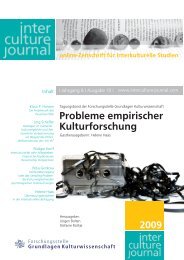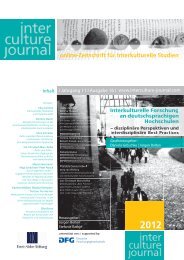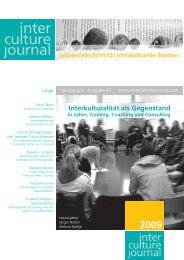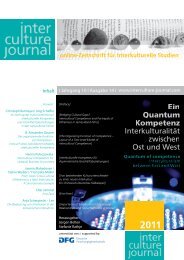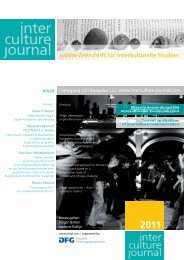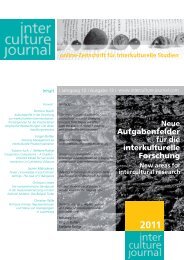Interkulturellen Kompetenz forschung - Frankfurt School of Finance ...
Interkulturellen Kompetenz forschung - Frankfurt School of Finance ...
Interkulturellen Kompetenz forschung - Frankfurt School of Finance ...
Sie wollen auch ein ePaper? Erhöhen Sie die Reichweite Ihrer Titel.
YUMPU macht aus Druck-PDFs automatisch weboptimierte ePaper, die Google liebt.
Gröschke: Gruppenkompetenz in interkulturellen Situationen<br />
Kuppens, P. et al. (2006): Universal Intracultural and Intercultural Dimensions<br />
<strong>of</strong> the Recalled Frequency <strong>of</strong> Emotional Experience. Journal <strong>of</strong> Cross-<br />
Cultural Psychology 37(5), S. 491-515.<br />
Mae, M. (2003). Transkulturalität und interkulturelle <strong>Kompetenz</strong>. Erwägen,<br />
Wissen, Ethik 14(1), S. 194-196.<br />
Mall, R. A. (2003): Interkulturelle <strong>Kompetenz</strong> jenseits bloßer “political correctness”.<br />
Erwägen, Wissen, Ethik 14(1), S. 196-198.<br />
Martin, M. M. / Anderson, C. M. (1998): The Cognitive Flexibility Scale. The<br />
Validity Studies. Communication Reports 11(1), S. 1-9.<br />
Martin, M. M. / Rubin, R. B. (1995): A new measure <strong>of</strong> cognitive flexibility.<br />
Psychological Reports 76(April), S. 623-626.<br />
Maznewski, M. L. / DiStefano, J. J. (2000): Global Leaders are Team Players.<br />
Developing global leaders through membership in global teams. Human<br />
Resource Management 39 (2/3), S. 195-208.<br />
McClelland, D. C. (1998): Identifying competencies with behavioral-event<br />
interviews. Psychological Science 9(5), S. 331-339.<br />
Müller, S. / Gelbrich, K. (2001): Interkulturelle <strong>Kompetenz</strong> als neuartige<br />
Anforderung an Entsandte. Status quo und Perspektiven der Forschung.<br />
Schmalenbachs Zeitschrift für betriebswirtschaftliche Forschung 53(Mai), S.<br />
246-272.<br />
Otto, B. / Lang, A. / Schmitz, B. (2007): Selbstregulation in der Verhandlungsführung.<br />
Zeitschrift für Arbeits- und Organisationspsychologie 51(2), S. 68-78.<br />
Oyserman, D. / Coon, H. M. / Kemmelmeier, M. (2002): Rethinking Individualism<br />
and Collectivism. Evaluation <strong>of</strong> Theoretical Assumptions and Meta-<br />
Analysis. Psychological Bulletin 1, S. 3-72.<br />
Pawlowsky, P. / Menzel, D. / Wilkens, U. (2005): Wissens- und <strong>Kompetenz</strong>erfassung<br />
in Organisationen. In: Sonntag, K.-H. et al. (Hrsg.): <strong>Kompetenz</strong>messung<br />
in Unternehmen. Münster: Waxmann, S. 343-453.<br />
Perels, F. / Schmitz, B. / Bruder, R. (2005): Lernstrategien zur Förderung von<br />
mathematischer Problemlösekompetenz. In: Moschner, B. / Artelt, C.<br />
(Hrsg.): Lernstrategien und Metakognition. Implikationen für Forschung<br />
und Praxis. Münster: Waxmann, S. 155-176.<br />
Pescosolido, A. T. (2003): Group Efficacy and Group Effectiveness. The Effects<br />
<strong>of</strong> Group Efficacy over Time on Group Performance and Development.<br />
Small Group Research 34(1), S. 20-42.<br />
Pettigrew, T. F. (1998): Intergroup Contact Theory. Annual Review <strong>of</strong> Psychology<br />
49, S. 65-85.<br />
Podsiadlowski, A. (2002): Multikulturelle Arbeitsgruppen in Unternehmen.<br />
Münster: Waxmann.<br />
Roy, M. H. / Dugal, S. S. (1998): Developing Trust. The importance <strong>of</strong> cognitive<br />
felexibility and co-operative contexts. Management Decision 36(9), S.<br />
561-567.<br />
Schippers, M. C. / den Hartog, D. / Koopman, P. L. (2007): Reflexivity in<br />
Teams. A Measure and Correlates. Applied Psychology. An International<br />
Review 56(2), S. 189-211.<br />
© Interculture Journal 2010 | 12 76



